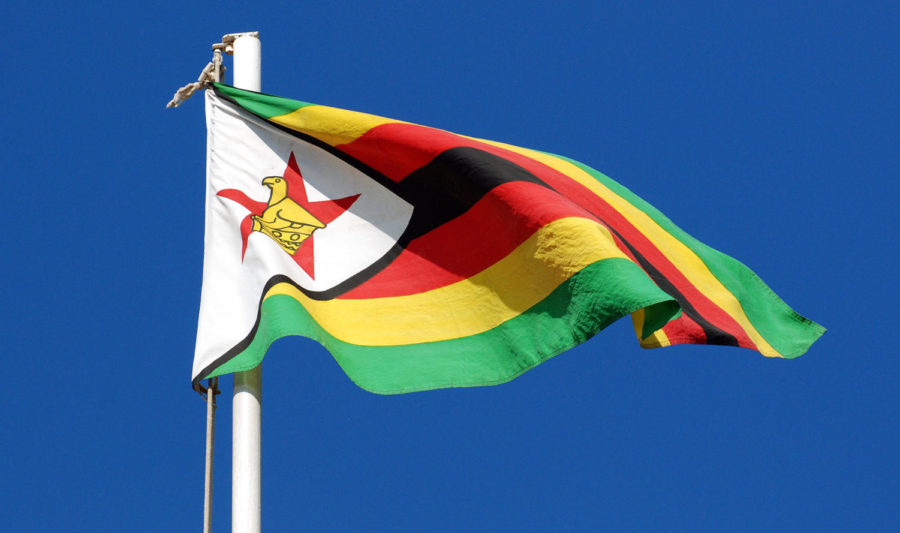Guest Column: COVID-19, a Zimbabwean experience
Guest Columnist Rodney E. M. Katsidzira shares his perspective on the COVID-19 pandemic in Zimbabwe.
September 30, 2021
The scenes of mass burials in New York on television will forever be etched on my mind. At that point, around January 2020, Zimbabweans had started seeing the Grim Reaper, also causing death in China and Europe.
The first COVID-19 case in Zimbabwe that made the local news was that of a 30-year-old male media personality. He had just returned from New York a few days earlier and had frequented a nightclub days after his arrival. He subsequently died. His much-publicized efforts to obtain critical medical care jolted Zimbabwe.
In March 2020, The Zimbabwean government responded by instituting a lockdown, which resulted in school closures. Face masks became mandatory across Zimbabwe. Police erected roadblocks on major highways to limit the movement of people. Commercial activities were limited, and a dawn-to-dusk curfew was imposed. Social distancing and limiting the number of people in supermarkets were enforced. Patients such as my father, in need of elective surgery, were warned that hospitals would not prioritize them.
As the ordeal continued to unfold, Zimbabweans watched in disbelief as President Donald Trump denied the dangers that COVID-19 posed and did not encourage mask-wearing, although he would later contract COVID-19. He had access to the best healthcare, which made his situation less severe.
Not everyone was as lucky.
I suffer from asthma and have always struggled to manage my condition during colder times of the year, between June and July. I used a preventive steroid, so that come Zimbabwe’s winter season, I would remain asthma-free. After my walk one Sunday morning, I felt abnormally fatigued. By Monday, I had a sore throat and a slight cough. On Wednesday, I went to the doctor, and he prescribed cough syrup and antibiotics and instructed me to continue my asthma medication. Yet my symptoms escalated. I lost my appetite. I had a heightened sense of taste and could only tolerate unsalted food. I eventually lost my sense of smell.
I decided to self-isolate.
I could barely walk without having to catch my breath. Three days after finishing my antibiotics course, my sore throat still persisted. The doctor confirmed my vitals were fine and my body temperature was normal. I received another dose of antibiotics and cough medicine.
My recovery came after about three weeks. That’s when I learned from my friend I had met a month before getting ill that he had also been ill two weeks before, and his wife developed similar symptoms a week after my recovery. I explained these symptoms to a family member who is a physician, and he wondered whether I might have contracted COVID-19. I wasn’t able to confirm this, though, because tests were not readily available. Nonetheless, I followed the COVID-19 guidelines to protect my family and me.
The vaccination program by the Zimbabwean government has yielded positive results. Improvement in child survival and eradication of polio are two such examples. In March 2021, Zimbabwe received Sinopharm and Sinovac vaccines from China. I relied on the World Health Organization, Centers for Disease Control and my own physician to keep me informed correctly about the vaccines. Empirical data from health care workers revealed a telling statistic: 9 out of 10 patients who died from COVID-19 were unvaccinated. My background in science helped me to separate facts from misinformation about COVID-19. With my asthma risks, it was, therefore, a no-brainer for me to be vaccinated.
After receiving the shot, I did not develop severe side-effects whatsoever, despite the rumor mills churning out a wide variety of adverse reactions. In spite of all this, my parents, who are in their seventies, were hesitant. Having family members in the health care system didn’t seem to matter. It took a fair amount of conversation before my parents decided to get the shot.
The delta variant arrived between July and August 2021 and proved to be more virulent and lethal. This prompted the Zimbabwe government to issue much tighter restrictions. Schools closed earlier — a wise decision as this is our winter, where colds, flu and related ailments tend to peak.
I lost a school friend, a distant uncle and a brother-in-law to COVID-19. I wasn’t able to attend their funerals because of government-mandated restrictions. My other family members missed the funerals because they had contracted COVID-19 and had to self-quarantine. The ordeal is an all-too-common story, leaving families with little or no closure. Zoom, YouTube, Facebook and other digital media platforms are now becoming the platforms for funerals.
In Zimbabwe, we are beginning to accept life with COVID-19. Yet I wonder: What will the future look like for my 9-year-old daughter? She has been home with limited contact time with friends and extended family over a long period. Even though the government instituted radio lessons for public schools, kids need contact with their teachers for learning new concepts. The radio lessons were hardly effective for some children. Most parents have tried to become teachers overnight. I have tried to add in visits to the public library with my daughter to bring some sort of normalcy to the situation. Time will tell us what will become of this generation of learners.
Mental health is also a concern.
Psychosocial services do not exist for children in Zimbabwe, and the situation is not any better when parents struggle to put food on the table in a country where no social safety net is provided.
As a Christian, I try to juxtapose the tragedy unfolding in our lifetime, with great difficulty, with the punishment meted out by God repeatedly on Israel for their sinfulness, yet he forgave them each time. I might never know the why of the COVID-19 outbreak, but I do know that the world will never be the same.
Rodney E. M. Katsidzira currently lives in Zimbabwe and is a friend of guest columnist and adjunct associate professor Walter Suza.

















